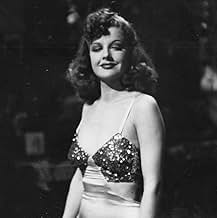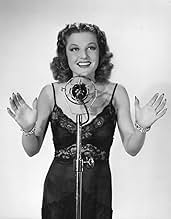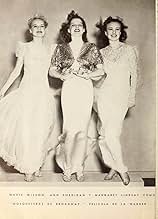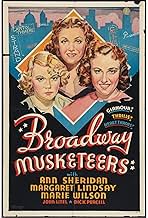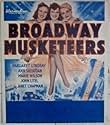Drama about three girl graduates of an orphanage whose paths cross.Drama about three girl graduates of an orphanage whose paths cross.Drama about three girl graduates of an orphanage whose paths cross.
Horace McMahon
- Gurk - Vince's Henchman
- (as Horace MacMahon)
Jimmy Conlin
- Mr. Hobart Skinner
- (as James Conlon)
John Ridgely
- Master of Ceremonies
- (scenes deleted)
John Alban
- Nightclub Patron
- (uncredited)
Marian Alden
- Floor Nurse
- (uncredited)
Edward Biby
- Nightclub Patron
- (uncredited)
Oscar Blank
- Nightclub Patron
- (uncredited)
- Director
- Writers
- All cast & crew
- Production, box office & more at IMDbPro
Featured reviews
One of the better Pre-Code movies was "Three on a Match" (1932). Not only was it a terrific film but it's one of Bette Davis' earliest films. It also is extremely lurid--the sort of way only Pre-Code films could be. Now, six years later, Warner Brothers have remade the picture as "Broadway Musketeer"...but with many of the more salacious scenes missing (such as the ultra-violent ending in the original). Considering how wonderful "Three on a Match" was, I just couldn't understand remaking it...but on a lark I decided to give this other film a try.
The film has nothing to do with Broadway...and none of the characters have anything to do with the theater. Instead, it's about three women who grew up together in an orphanage, Isabelle (Margaret Lindsay), Fay (Ann Sheridan) and Connie (Marie Wilson). The film begins long after the three friends went their separate ways. Isabelle is married to a very successful man and has everything a woman could have wanted, Fay performs a racy* routine in nightclubs and Marie is a stenographer...an underdeveloped part. However, despite Isabelle having a child and loving husband, she's longing for excitement and ultimately destroys herself and loses her family. At the same time, Fay and Connie step in to pick up the pieces of Isabelle's family. What's next? Well, for starters, Isabelle manages to make things even worse---even after her husband divorces her.
This is a very competent film and the cast is fine. However, they certainly aren't better than the original cast and the script is amazingly tame and lacks the edge and excitement of the original. Worth seeing, perhaps...but I suggest you just see "Three on a Match".
*The racy dance is hilariously tame--so much so that you could perform it at a Baptist picnic!! This is one case where the Post- Code standards just didn't make any sense, as she was arrested for this lewd dance...a dance where all of her clothes remained on her body and the gyrations were minimal!
The film has nothing to do with Broadway...and none of the characters have anything to do with the theater. Instead, it's about three women who grew up together in an orphanage, Isabelle (Margaret Lindsay), Fay (Ann Sheridan) and Connie (Marie Wilson). The film begins long after the three friends went their separate ways. Isabelle is married to a very successful man and has everything a woman could have wanted, Fay performs a racy* routine in nightclubs and Marie is a stenographer...an underdeveloped part. However, despite Isabelle having a child and loving husband, she's longing for excitement and ultimately destroys herself and loses her family. At the same time, Fay and Connie step in to pick up the pieces of Isabelle's family. What's next? Well, for starters, Isabelle manages to make things even worse---even after her husband divorces her.
This is a very competent film and the cast is fine. However, they certainly aren't better than the original cast and the script is amazingly tame and lacks the edge and excitement of the original. Worth seeing, perhaps...but I suggest you just see "Three on a Match".
*The racy dance is hilariously tame--so much so that you could perform it at a Baptist picnic!! This is one case where the Post- Code standards just didn't make any sense, as she was arrested for this lewd dance...a dance where all of her clothes remained on her body and the gyrations were minimal!
Isabel Dowling (Margaret Lindsay), Fay Reynolds (Ann Sheridan), and Connie Todd (Marie Wilson) are best friends from their days at the orphanage. Fay gets arrested for performing in a nightclub and the other two bail her out. They plan to meet every year on the same day and in the same restaurant. It is a chaos of melodrama as their worlds collide. Isabel's life falls apart while Fay replaces her.
This is a remake of Three on a Match (1932) and I marginally didn't like that one. I do like this version ever so slightly better. While still melodramatic, it may not be as chaotic as its previous version. For one, let's look at the jumping out the window scene. In this version, she is planning out her deliberate sacrifice. In the original, she's going crazy putting on lipstick and jumps out in madness. This version is a compelling act while the original is campy melodrama. This version is better.
This is a remake of Three on a Match (1932) and I marginally didn't like that one. I do like this version ever so slightly better. While still melodramatic, it may not be as chaotic as its previous version. For one, let's look at the jumping out the window scene. In this version, she is planning out her deliberate sacrifice. In the original, she's going crazy putting on lipstick and jumps out in madness. This version is a compelling act while the original is campy melodrama. This version is better.
I found this remake of Three on a Match to be a bit more enjoyable than the original, thanks in no small part to the presence of Ann Sheridan.
Nobody could pull off (no pun intended) an above-the-shoulder striptease like Miss Sheridan. Wowser! I know she didn't care much for her well-known nickname but you can see why the name stuck.
Elsewhere in the movie John Litel does his usual job of providing solid support and little Janet Chapman is something else. She has to be one of the most likable child actors that I've ever seen in the movies.
It's interesting to note that the very last scene in Broadway Musketeers, Ann Sheridan and Janet Chapman embracing, is nearly identical to the final shot of Little Miss Thoroughbred, also directed by John Farrow.
Nobody could pull off (no pun intended) an above-the-shoulder striptease like Miss Sheridan. Wowser! I know she didn't care much for her well-known nickname but you can see why the name stuck.
Elsewhere in the movie John Litel does his usual job of providing solid support and little Janet Chapman is something else. She has to be one of the most likable child actors that I've ever seen in the movies.
It's interesting to note that the very last scene in Broadway Musketeers, Ann Sheridan and Janet Chapman embracing, is nearly identical to the final shot of Little Miss Thoroughbred, also directed by John Farrow.
Three women who grew up in the same orphanage -- Margaret Lindsay, Ann Sheridan, and Marie Wilson -- lead very different lives. Miss Lindsay marries wealthy John Litel. They have a child, but then she divorces him. Miss SHeridan becomes a nightclub singer, who marries Litel later. And Miss Wilson offers some comic relief. They meet every year for a dinner.
It's a B remake of THREE ON A MATCH (1932), and lacks the pre-code snap of the earlier version. Most of the tension is reserved for a kidnapping towards the end by gangster Dick Purcell, with Dewey Robinson getting a nice role as the soft-hearted henchman. Directed for speed by John Farrow, it's watchable, but I wouldn't stay up late to watch it. Fortunately, my TV comes equipped with a DVR.
It's a B remake of THREE ON A MATCH (1932), and lacks the pre-code snap of the earlier version. Most of the tension is reserved for a kidnapping towards the end by gangster Dick Purcell, with Dewey Robinson getting a nice role as the soft-hearted henchman. Directed for speed by John Farrow, it's watchable, but I wouldn't stay up late to watch it. Fortunately, my TV comes equipped with a DVR.
... says a cop before arresting Ann Sheridan's character for a burlesque dance that doesn't amount to anything. If he's seen enough, all I can say is that this cop is probably a bachelor. Actually, it wasn't long after this scene that I had seen enough, because it is obvious this is a production code remake of "Three on a Match" from six years before, and even with Oomph girl Ann Sheridan, all of the oomph has been taken out of the plot.
The basic outline is the same as the original . This time the three girls grew up in an orphanage rather than having gone to the same elementary school. One has a checkered past and present (Sheridan) but is a good person, one is a rather mousy secretary (Marie Wilson), and one (Margaret Lindsay) has married a rich guy who dotes on her and yet she is not haaappy ( misspelled on purpose).
Lindsay's character takes up with a gambling gold digger, Wilson's character doesn't have that much to do, and Sheridan's character marries the deserted rich guy after the divorce. After her divorce settlement money runs out, Lindsay's gambling man, now her husband, writes bad checks to the mob to cover his gambling debts. Complications ensue.
The precode version of this was a couple of notches better than this for a number of reasons. Like a bunch of Puritan women in a chorus line, it is just too modest and humble for anything to come of it. And finally a warning - Warner Brothers seemed to make a habit of making movies in the mid to late 30s that had the word "Broadway" in the title to imply a vitality and glamour that the film just didn't possess. This is one of those films. The title is preposterous in fact. Although the plot does involve friendship, there is nothing of footlights in this movie.
The basic outline is the same as the original . This time the three girls grew up in an orphanage rather than having gone to the same elementary school. One has a checkered past and present (Sheridan) but is a good person, one is a rather mousy secretary (Marie Wilson), and one (Margaret Lindsay) has married a rich guy who dotes on her and yet she is not haaappy ( misspelled on purpose).
Lindsay's character takes up with a gambling gold digger, Wilson's character doesn't have that much to do, and Sheridan's character marries the deserted rich guy after the divorce. After her divorce settlement money runs out, Lindsay's gambling man, now her husband, writes bad checks to the mob to cover his gambling debts. Complications ensue.
The precode version of this was a couple of notches better than this for a number of reasons. Like a bunch of Puritan women in a chorus line, it is just too modest and humble for anything to come of it. And finally a warning - Warner Brothers seemed to make a habit of making movies in the mid to late 30s that had the word "Broadway" in the title to imply a vitality and glamour that the film just didn't possess. This is one of those films. The title is preposterous in fact. Although the plot does involve friendship, there is nothing of footlights in this movie.
Did you know
- TriviaIn his book, "Those Crazy, Wonderful Years When We Ran Warner Brothers," former studio page boy Stuart Jerome recalls a bizarre incident that happened with this film. During the preview screenings, several members of the audience started laughing during a crucial dramatic scene when Dewey Robinson's gangster character slapped Margaret Lindsay. Director John Farrow and studio executive Bryan Foy could not figure out why the audience members were laughing. They set up a private screening of the scene and ran it several times before they discovered the problem. At the moment when Robinson slapped Lindsay, his fly was visibly open! It was the kind of mistake that only a few people in the audience would notice, but which could easily spoil the dramatic effect of the scene. Following the discovery, the entire scene had to be re-shot. The set for the scene was re-built, Margaret Lindsay was borrowed from her current Warner Brothers picture, and Robinson was re-hired at one day's pay. Bryan Foy personally stopped by the set on the day of re-shooting to make sure that Robinson's fly was closed. As Jerome recalled, the incident prompted Foy to send out a memo to all directors and script clerks at Warner Brothers that they should make sure that all male actors had their flies fully zipped up before shooting a scene.
- GoofsPhil writes out a check to Vince for $2,450 on New Years Eve/Day. However, in the next scene where the check has bounced, it is dated June 12th.
- Quotes
Isabel 'Isabelle' Dowling Peyton: [when all three ladies are about to drink a toast] Here's to us. Well?
Miss Connie Todd: May we never have shiny noses.
- ConnectionsReferences Blanche-Neige et les Sept Nains (1937)
- SoundtracksWho Said That This Isn't Love?
(uncredited)
Music by M.K. Jerome
Lyrics by Jack Scholl
Played during the opening credits
Sung by Ann Sheridan
Reprised instrumentally by a phonograph record
Played as background music often
Details
- Runtime
- 1h 3m(63 min)
- Color
- Sound mix
- Aspect ratio
- 1.37 : 1
Contribute to this page
Suggest an edit or add missing content


